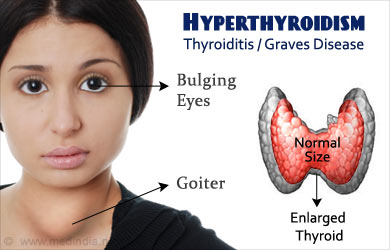
Hyperthyroidism symptoms are more often than not very similar to those of hyperthyroidism
Many people who suffer from hyperthyroidism don't even know that they have the condition, as it's fairly rare. Most people will eventually find out that they do have this condition, though, if it becomes severe and affects their daily activities.
The thyroid gland is part of the endocrine system and is responsible for producing hormones that regulate metabolism. The thyroid produces a hormone known as TSH (Thyroid Stimulating Hormone). TSH is produced when your body produces an excess of the thyroid hormone, which then goes into action in order to regulate your body's production of this thyroid hormone.
Hyperthyroidism symptoms can vary depending on the specific condition that you suffer from. There are also a number of different treatments available to treat this condition. The most common treatment used for this condition is anti-thyroid medication.
Anti-thyroid medications are generally prescribed by doctors and used to regulate the levels of this thyroid hormone in the body. The most common medication used for treating this condition is Levothyroxine or Synthroid. If you are taking anti-thyroid medication and begin to notice any of the hyperthyroidism symptoms, be sure to contact your doctor immediately.
There are some other natural ways of regulating the levels of this hormone that many people are using. One of these ways is hypothyroidism, where the patient is treated using a hormone that is designed to decrease the production of the thyroid hormone, and thus making it more manageable.
There are some other natural methods that involve manipulating the Thyroid gland itself. Many sufferers of hyperthyroidism are advised to try acupuncture, as this is able to stop the release of the thyroid hormone. In some cases, patients are also advised to try using a special diet that will help reduce their thyroid function, as well as to exercise.
When trying to find a way to naturally regulate your thyroid hormone levels, be sure to first talk to your doctor and see what type of treatment is right for you. Hypothyroidism is a serious condition, so it is important that you talk to your doctor about what you are suffering from in order to find out the best treatment option for you.
Hyperthyroidism symptoms may occur in one or both of the following ways: weight gain, depression, insomnia, poor energy levels, or a slow pulse rate. It is important to remember that if you notice any of the above symptoms, you should contact your doctor as soon as possible. There are plenty of hyperthyroidism treatment options and finding the treatment that will work for you will be all you need to start getting back your life back.
Your doctor will be able to check to see if your thyroid function is not working properly
He may also order tests to make sure your thyroid gland is functioning properly. This includes a blood test, which checks the level of the thyroid hormone, as well as a scan of the brain to make sure the pituitary gland is working normally. Your doctor can also diagnose hyperthyroidism by performing a complete blood count to make sure that there are no problems with your heart.
Once your doctor checks everything is in order, he will prescribe the treatment you need to naturally regulate the levels of this thyroid hormone in your body. Most commonly, you will get a shot that contains the hormone and a pill that will help the body produce its own hormones.
You will be given this medication on a daily basis until the problem has been treated. Be sure to be careful when you take your medications as you may have side effects, but it is always best to consult your doctor or health care provider before you start taking any type of medicine.
Hyperthyroidism symptoms can be very uncomfortable at times, so it is important to make sure you keep a close watch on what you eat and how much you take in. Eating foods high in iodine, such as eggs, liver and fish, can help your body regulate your thyroid hormone levels to prevent hyperthyroidism.
Leave a Reply